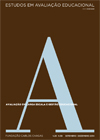Educational evaluation and its consequences in federal actions and the electronic media
DOI:
https://doi.org/10.18222/eae255920142770Keywords:
Educational Evaluation, Prova Brasil, Provinha Brasil, School Development PlanAbstract
The purpose of this study is to discuss the uses of the results of Brazilian educational evaluations for some actions developed by the Plano de Desenvolvimento da Escola, their possible consequences in the work of schools and how the electronic written media has been approaching this topic. The right to learning and the process of accountability, axes of governmental actions in recent years, are discussed. Next, the development of the tests given to elementary school students between 1990 and 2012, identifying their instruments and principal results, are analyzed. Due to the current importance of the tests as an indicator of educational quality, how electronic communications media treat this quality is also investigated. It is concluded that the tests have been used, basically, as an instrument to define school performance, with undesirable consequences for the work that they and their professionals are doing, such that the focus of the actions has been to seek to improve the performance on the tests.
Downloads
References
AFONSO, Almerindo J. Estado, mercado, comunidades e avaliação: esboço para uma rearticulação crítica. Educação e Sociedade, Campinas, v. 20, n. 69, p. 139-164, 1999. DOI: https://doi.org/10.1590/S0101-73301999000400007
AFONSO, Almerindo J. Avaliação educacional: regulação e emancipação. São Paulo: Cortez, 2005. BONAMINO, Alícia C.; SOUZA, Sandra Z. Três gerações de avaliação da educação básica no Brasil: interfaces com o currículo da/na escola. Educação e Pesquisa, São Paulo, v. 38, n. 2, p. 373-388, 2012. DOI: https://doi.org/10.1590/S1517-97022012005000006
BRASIL. Instituto Nacional de Estudos e Pesquisas Educacionais Anísio Teixeira. Resultados das edições anteriores. Brasília, DF: Inep, 2011. Disponível em: <http://portal.inep.gov.br/web/saeb/resultados>. Acesso em: dez. 2014.
BRASIL. Ministério da Educação. O Plano de Desenvolvimento da Educação: razões, princípios e programas. Brasília: MEC, 2011.
BRASIL. Ministério da Educação. Elementos conceituais e metodológicos para a definição dos direitos de aprendizagem e desenvolvimento do ciclo de alfabetização (1º, 2º e 3º anos) do ensino fundamental. Brasília: MEC, 2012.
BRASIL. Ministério da Educação. Instituto Nacional de Estudos e Pesquisas Educacionais Anísio Teixeira.; FUNDO DAS NAÇÕES UNIDAS PARA A INFÂNCIA. Aprova Brasil: o direito de aprender. Brasília: Unicef, 2007.
BROOKE, Nigel; CUNHA, Maria Amália A.; FALEIROS, Matheus. A avaliação externa como instrumento da gestão educacional dos estados. São Paulo: Game/FAE/ UFMG, 2011.
FUNDO DAS NAÇÕES UNIDAS PARA A INFÂNCIA; BRASIL. Ministério da Educação; UNIÃO DOS DIRIGENTES MUNICIPAIS DE EDUCAÇÃO. Redes de aprendizagem: boas práticas de municípios que garantem o direito de aprender. Brasília: Unicef, 2008.
GATTI, Bernadete A. Avaliação educacional: pontuando uma história de ações. EccoS revista científica, São Paulo, v. 4, n. 1, p. 17-41, jun. 2002. DOI: https://doi.org/10.5585/eccos.v4i1.291
HANUSHECK, Eric A.; KAIN, Jonh F.; RIVKIN, Steven G. Do higher salaries buy better teachers? National Bureau of Economic Research, Washington, 1999. DOI: https://doi.org/10.3386/w7082
HORTA NETO, João Luiz. Avaliação externa de escolas e sistemas: questões presentes no debate sobre o tema. Revista Brasileira de Estudos Pedagógicos, Brasília, v. 91, n. 227, p. 84-104, jan./abr. 2010. DOI: https://doi.org/10.24109/2176-6681.rbep.91i227.604
HORTA NETO, João Luiz. As avaliações externas e seus efeitos sobre as políticas educacionais: uma análise comparada entre a União e os Estados de Minas Gerais e São Paulo. 2013. Tese (Doutorado em Política Social) – Instituto de Ciências Humanas, Departamento de Serviço Social, Brasília. 2013.
INGERSOLL, Richard M. Teacher turnover and teacher shortages: an organization analysis. American Educational Research Jounal, Washington, DC, v. 38, n. 3, p. 499-534, 2001. DOI: https://doi.org/10.3102/00028312038003499
KORTE, Robert C.; NASH, Beverly E. Review of the Sistema Nacional de Avaliação da Educação Básica (Saeb). Brasília: Inep, 1995.
LUCIO, Elizabeth O. Tecendo os fios da rede: o Programa Pró-Letramento e a tutoria na formação continuada de professores alfabetizadores da educação básica. 2010. Dissertação (Mestrado em Educação) – Faculdade de Educação, Universidade Federal do Rio de Janeiro, Rio de Janeiro, 2010.
OLIVEIRA, Romualdo P.; ARAÚJO, G. C. Qualidade do ensino: uma nova dimensão da luta pelo direito à educação. Revista Brasileira de Educação, São Paulo, n. 28, p. 13-35, jan./abr. 2005. DOI: https://doi.org/10.1590/S1413-24782005000100002
RAVITCH, Diane. The death and life of the graet american school system: how testing and choice are undermining education. Nova York: Basic Books, 2010.
RAVITCH, Diane. Reign of error: the hoax of the privatization movement and the danger to america’s public schools. Nova York: Alfred A. Knopf, 2013.
SAHLBERG, Pasi. Finnish lessons: what can the world learn from educactional change in Finland? Nova York: Teacher College Press, 2011.
SOARES, Magda B. Por uma alfabetização até os oito anos de idade. In: TODOS PELA EDUCAÇÃO. De olho nas metas 2010. São Paulo: Todos pela Educação, 2010. p. 14-17.
VIANNA, Heraldo M. Avaliação do rendimento de alunos de escolas da rede pública: um estudo em 15 capitais e 24 outras cidades. São Paulo: Fundação Carlos Chagas, 1990.
Downloads
Published
How to Cite
Issue
Section
License
Authors who publish in this journal agree to the following terms:
a. Authors retain the copyright and grant the journal the right to first publication, with the paper simultaneously licensed under the Creative Commons Attribution License (CC BY 4.0) license that allows the sharing of the paper with acknowledgment of authorship and initial publication in this journal.
b. Authors are authorized to assume additional contracts separately, for non-exclusive distribution of the version of the paper published in this journal (for example publishing in institutional repository or as a book chapter), with acknowledgment of authorship and initial publication in this journal.
c. Authors are allowed and encouraged to publish and distribute their paper on-line (for example in institutional repositories or on their personal page) at any moment before or during the editorial process, as this can generate productive changes, as well as increase the impact and citation of the published paper (See The Effect of Open Access).








